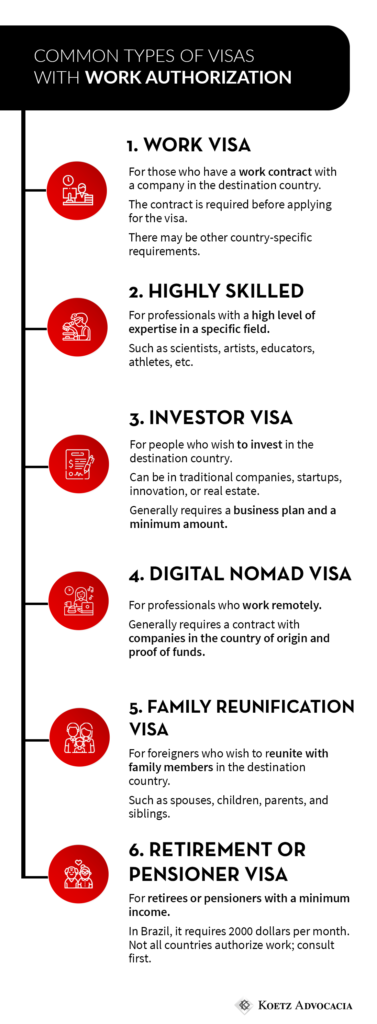
Migration, Visas and Residence of Foreigners to Brazil /
Brazilian visa overstay: how to regularize your situation
Every year, foreigners from all around the world choose to visit or even live in Brazil for several reasons.
For this to be possible, however, it may be necessary to obtain a visa, which is nothing more than an authorization which will guarantee a regular stay during your time in Brazil.
Also, it’s important to pay attention to the expiration date on the visa, in order to avoid possible problems in the future. If your visa expires, however, some measures must be taken to solve the issue.
In this article, we are going to explain about the proceeding regarding the regularization of visas by foreigners in Brazil, which must be followed correctly according to each specific situation.
Author: Leonardo Almeida Lacerda de Melo
What are the types of Brazilian visas?
Brazil currently offers many types of visas to citizens from other countries, but they must be chosen according to the purpose of the trip and the peculiarities of each case.
Among the most common ones is the Visitor Visa. This type of visa may be granted to foreign people who wish to enter the country and stay for up to 90 days, with no intention of engaging in paid activities, in the following situations:
- Tourism;
- Business;
- Transit;
- Artistic or sport activities.
Apart from the Visitor Visa, there are also the Diplomatic and Official visas, which are specifically designed for foreign authorities and employees who travel to Brazil while on an official mission, representing a foreign State or an International Organization.
Similarly, the Courtesy Visa allows for the partners and dependents of these authorities and employees to travel with them, and it may also be granted to artists and sportspeople who are looking to participate in free and cultural events.
The text continues after the image.

Finally, there is also the Temporary Visa, which is mainly intended for the following purposes, among others:
- Research, education or academic extension;
- Health treatment;
- Humanitarian reception;
- Students;
- Paid work;
- Working-holiday;
- Religious activity;
- Voluntary service;
- Family reunion.
It is vital to remember that Brazilian visas must be required before the trip and still in the country of origin of the applicant, through a Brazilian Embassy, Consulate or Vice-Consulate there.
Do all foreigners need a visa to enter Brazil?
No. Actually, the need for a Brazilian visa will depend on some factors, such as the nationality of the foreigner and the reasons why they wish to enter the country.
After all, our country has signed many diplomatic agreements with other countries which exempt their citizens from requiring a visa to enter here. This is the case with Mercosur countries and countries that border Brazil, such as Argentina, Uruguay, Paraguay, and Colombia, for instance.
Therefore, based on a reciprocity solidified in the agreement, Brazilian citizens are also exempt from requiring a visa to enter these countries, in the same conditions offered to their citizens in Brazil.
However, even in these situations, it is always important that the foreigner pays attention to the maximum duration of stay in Brazilian territory that was granted to them, according to their type of visa and/or their nationality.
This means that, although an Argentinian tourist or a Colombian tourist may not need a visa to enter Brazil, they can only stay regularly in Brazil for the period permitted by the authorities.
What are the consequences of overstaying your visa?
According to the current legislation, a foreigner who overstays a visa within Brazilian territory may suffer penalties due to their irregular stay.
Thus, they may have to pay a fine which varies from R$ 100,00 (one hundred reais) to R$ 10,000.00 (ten thousand reais), depending on the number of days that the foreigner stayed irregularly in the country.
Aside from the fine, in case they don’t regularize their situation within the given time or leave the country, they may also face deportation to their country of origin.
However, this forced removal will not occur automatically, which means that before any possibility of deportation, the foreigner is going to have the right to an administrative proceeding, with full defense guaranteed by Brazilian law.
I have overstayed my visa. How can I regularize my situation?
In case of visa overstay, the foreigner will be notified by the Federal Police in order to either leave the country voluntarily or regularize their migration situation within 60 days, according to Brazilian law.
This deadline may be extended for another 60 days, as long as the foreigner goes to the Federal Police office to justify the need of extension and signs a term of commitment, providing the police with their updated address in Brazil.
It is extremely important that the foreigner respects this deadline, as to avoid being deported if they stay in the country and don’t regularize their situation.
The same may happen if they don’t regularize their status and later decide to leave the country after the deadline has expired, in which case they will also be considered as having been deported.
Also, they may be penalized with the aforementioned fine, which will be raised for each day they overstay their visa. As it was also said, the Foreigner will be able to defend themselves.
Therefore, if they choose to stay in Brazil and not leave the country, an administrative proceeding will be initiated by the Federal Police, which must contain the notification and the foreigner’s manifestation of will, if there is any.
The proceeding of migratory regularization is specific and varies according to the foreigner’s intention and nationality, and each step, as well as the necessary documents, will be informed by the Federal Police.
Depending on the situation, the foreigner may request one of the several types of residence permits with a fixed term in case they meet the specific requirements of that type.
This means that if the foreigner is granted this permit, they will be able to establish residency in Brazil for a determined period of time, which may be extended, or converted into a permanent residence permit.
Some main types of residence permit are:
- Family reunion;
- Digital nomad;
- For study purposes;
- Real estate investors;
- Health treatments;
- Retirees or pensioners;
- Among others.
The residence permit proceeding may be simplified under certain circumstances, such as if the foreigner comes from one of the Mercosur member states or a country which borders Brazil, due to the various bilateral agreements between them.
Another possibility applies for those migrants who prove they are escaping persecution, conflicts, or natural disasters in their countries of origin, who will also have specific proceedings in order to regularize their status here.
It is relevant to point out that some types of visas, such as the visit visa and some temporary visas, allow the foreigner to ask for an extension of their visa before their regular stay ends, depending on their nationality.
This possibility may be interesting for those who wish to expand their stay for some more time, and if granted, the foreigner will not find themselves in an irregular situation within their stay.
In every case, it is necessary for all foreigners in Brazil to take notice of their condition, their documentation, and the duration of their stay in the country. This is a way to avoid major problems and properly use their rights during their stay.
Do I need a lawyer to help me with the regularization proceeding?
It’s highly recommended for the foreigner who must regularize their migratory situation in Brazil to find specialized legal assistance.
Essentially, as it was explained before, the proceeding may be different in each situation depending on several factors, such as the purpose of the trip, the foreigner’s nationality, and other specificities of individual cases.
Consequently, having the support of a lawyer specialized in International and Immigration Law may simplify the bureaucracy often associated with such proceedings, as well as guarantee that all documents, forms, and deadlines will be presented, filled out, and observed correctly.
Besides, the person concerned may be advised on their current situation in Brazil and also debate about which is the best way to regularize their migratory condition. This is based on the lawyer’s knowledge of Brazilian law and their experience in the area.
Posts Relacionados:
Autor Convidado
A Koetz Advocacia convida advogados autores para colaborar em nosso site, para discutir assuntos internacionais e migratórios.
Saiba mais



